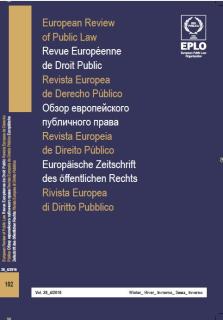
The Principle of Solidarity
in the Context of the Primary European Law
The principle of solidarity is a key legal instrument carrying fundamental importance within the European Union. Highlighted by primary European Law as well as by the Court of Justice of the European Union’s jurisprudence, solidarity as a common value and a basic cohesive bond between the Member States and their citizens acquires a structural importance for the institutional architecture of the EU. However, European Law faces major challenges with respect to the precise determination of the limits of the principle of social solidarity, with particular regard to a series of rights relating to social security benefits and social services. Despite these obstacles, solidarity has emerged as a vital mechanism for addressing and managing serious crises, including the European debt crisis and immigration and refugee policy.
Le principe de solidarité est un principal instrument juridique d’importance fondamentale au sein de l’Union européenne. Mise en exergue par le droit communautaire primaire ainsi que par la jurisprudence de la Cour de justice de l’Union européenne, la solidarité en tant que valeur commune et lien fondamental de cohésion entre les Etats membres et leurs citoyens acquiert une importance structurale pour l’architecture institutionnelle de l’UE. Cependant, le droit communautaire est confronté à des défis majeurs en ce qui concerne la détermination précise des limites du principe de solidarité sociale, particulièrement par rapport à une série de droits relatifs aux prestations sociales et aux services sociaux. Malgré ces obstacles, la solidarité constitue un mécanisme essentiel pour faire face à et gérer des crises graves, y compris la crise de la dette en Europe et la politique en matière d’immigration et de réfugiés.
* This article is based on the speech of the President of the Republic Mr. Prokopios Pavlopoulos, pronounced in Athens on 28 November 2016 on the occasion of the 20th anniversary from the foundation of the Hellenic Observatory of the London School of Economics and Political Science (LSE). The author would like to express his thanks to Mr. Nikiforos Meletiadis for his contribution to the English translation of this article.





















